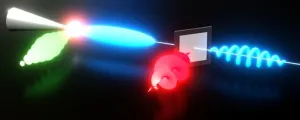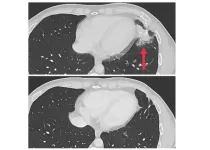(Press-News.org) Waltham — July 11, 2024 — An investigational medication designated TAS-303 shows efficacy and safety in treatment of women with stress urinary incontinence (SUI), reports a placebo-controlled clinical trial in the August issue of The Journal of Urology®, an Official Journal of the American Urological Association (AUA). The journal is published in the Lippincott portfolio by Wolters Kluwer.
"Our study adds new evidence that TAS-303 reduces the frequency of incontinence episodes in women with SUI, without the worrisome adverse effects associated with the existing SUI medication duloxetine," comments Prof. Momokazu Gotoh of Chukyo Hospital, Nagoya, Japan.
A safer medication option for treatment of SUI?
Stress urinary incontinence – defined as leakage on exertion or with sneezing or coughing – is a common clinical problem, particularly in women. Recommended treatments include pelvic floor muscle training (PFMT) and surgery (mid-urethral sling procedure). Currently, medication options for SUI are limited.
Duloxetine – a type of medication called a serotonin and noradrenaline reuptake inhibitor – is approved for treatment of SUI in Europe, but not in the United States or Japan. That reflects concerns about adverse effects, including a risk of nausea causing patients to discontinue treatment. Duloxetine has also been linked to a slightly increased risk of suicide or violence among patients with major depression.
TAS-303 is a different class of medication – a highly selective noradrenaline reuptake inhibitor – that has been shown to increase pressures within the urethra, potentially lessening leakage from the bladder. Because it is highly selective for the peripheral nervous system and does not affect serotonin reuptake, TAS-303 may avoid the adverse effects associated with duloxetine.
TAS-303 reduces SUI episode frequency while avoiding adverse effects
Building on promising results in preliminary studies, the researchers designed a phase 2 clinical trial to evaluate the effectiveness and safety of TAS-303 for SUI. In the study, 231 women with SUI symptoms were randomly assigned to treatment with TAS-303 or inactive placebo pills.
In the primary endpoint, percent change from baseline to week 12 in mean frequency of SUI episodes per 24 hours, patients assigned to TAS-303 had a significant reduction. On analysis accounting for other patient characteristics (least squares mean), the frequency of SUI episodes decreased by about 58% with TAS-303, compared to 47% in the placebo group. Frequency of SUI episodes decreased by at least half in 65% of patients in the TAS-303 group versus 53% with placebo.
The reduction in episode frequency with TAS-303 "was more clearly confirmed" in patients with more severe SUI (two or more episodes per day). The improvement also appeared greater in patients aged 60 years or older.
Benefits appeared within four weeks of treatment and continued through at least 12 weeks. The researchers suggest that combining TAS-303 with PMFT might allow for more rapid improvement – thus encouraging patients to continue PMFT exercises, which may take up to 12 weeks to show an effect. TAS-303 also showed improvement in urinary incontinence amount and health-related quality of life.
"Based on these findings, TAS-303 may be considered to have comparable efficacy with that of duloxetine and improved safety due to the absence of nervous system- or gastrointestinal-related adverse drug reactions," Dr. Gotoh and coauthors conclude. They emphasize that further studies in more diverse patient samples will be needed to confirm the effectiveness of TAS-303 for SUI.
Read Article: Efficacy and Safety of TAS-303 in Female Patients with Stress Urinary Incontinence: A Phase 2, Randomized, Double-Blind, Placebo-Controlled Trial
Wolters Kluwer provides trusted clinical technology and evidence-based solutions that engage clinicians, patients, researchers and students in effective decision-making and outcomes across healthcare. We support clinical effectiveness, learning and research, clinical surveillance and compliance, as well as data solutions. For more information about our solutions, visit https://www.wolterskluwer.com/en/health.
###
About Wolters Kluwer
Wolters Kluwer (EURONEXT: WKL) is a global leader in information, software solutions and services for professionals in healthcare; tax and accounting; financial and corporate compliance; legal and regulatory; corporate performance and ESG. We help our customers make critical decisions every day by providing expert solutions that combine deep domain knowledge with technology and services.
Wolters Kluwer reported 2023 annual revenues of €5.6 billion. The group serves customers in over 180 countries, maintains operations in over 40 countries, and employs approximately 21,400 people worldwide. The company is headquartered in Alphen aan den Rijn, the Netherlands.
For more information, visit www.wolterskluwer.com, follow us on LinkedIn, Facebook, YouTube and Instagram.
END
New medication for stress urinary incontinence? Investigational drug shows promise
TAS-303 improves SUI symptoms compared to placebo, reports Journal of Urology
2024-07-11
ELSE PRESS RELEASES FROM THIS DATE:
Warm or cold: Hibernation status matters when white-nose syndrome pathogen infects bats
2024-07-11
The fungal pathogen that causes white-nose syndrome (WNS) in bats uses different cell entry strategies depending on the host’s hibernation status – cold and inactive, or warm and active. The findings, which required the authors to develop a new bat cell line, highlight potential therapeutic interventions against WNS using epidermal growth factor receptor inhibitors, like the Food and Drug Administration-approved drug gefitinib. Bats – the second-most diverse group of mammals – play an important part in mitigating agricultural pests and the spread of insect-borne disease. However, millions of hibernating bats across North America are dying from ...
Barley’s rapid climate-driven adaption revealed in century-old biological experiment
2024-07-11
Leveraging one of the world’s oldest biological experiments – which began in 1929 – researchers have uncovered how a major crop, barley, was shaped by both agricultural pressures and its changing natural environment. The results underscore the power of long-term studies in understanding the dynamics of adaptive evolution. The survival of cultivated plants after their dispersal across different environments is a classic example of rapid adaptive evolution. For example, barley, an important neolithic crop, spread widely after domestication over 10,000 years ago to become a staple source of nutrition for humans and livestock throughout Europe, Asia, and Northern ...
Stratospheric air intrusions drive new particle formation in the upper troposphere
2024-07-11
New atmospheric particles form when stratospheric air intrudes into the troposphere below, according to a new study, revealing a previously unrecognized mechanism for new particle formation (NPF) in the upper troposphere. The finding suggests that NPF in these regions aloft occurs frequently and over large geographic regions, representing an important source of particles in the free troposphere. Aerosol particles smaller than one micron in diameter are abundant in the troposphere, the lowest layer of ...
Respiratory bacteria ‘turns off’ immune system to survive
2024-07-11
Researchers from The University of Queensland have identified how a common bacterium is able to manipulate the human immune system during respiratory infections and cause persistent illness.
The research, led by Professor Ulrike Kappler from UQ’s School of Chemical and Molecular Biosciences, studied the virulence mechanisms of Haemophilus influenzae, a bacterium that plays a significant role in worsening respiratory tract infections.
“These bacteria are especially damaging to vulnerable groups, such as those with cystic fibrosis, asthma, the elderly, ...
Structured electrons with chiral mass and charge
2024-07-11
Have you ever placed the palm of your left hand on the back of your right hand, in such a way that all fingers point in the same direction? If you have, then you probably know that your left thumb will not touch its right counterpart. Neither rotations nor translations nor their combinations can turn a left hand into a right hand and vice versa. This feature is called chirality.
Scientists at the University of Konstanz have now succeeded to imprint such a three-dimensional chirality onto the wave function of a single electron. They used laser light to shape the electron’s matter wave into left-handed or right-handed coils ...
Learning dance moves could help humanoid robots work better with humans
2024-07-11
Engineers at the University of California San Diego have trained a humanoid robot to effortlessly learn and perform a variety of expressive movements, including simple dance routines and gestures like waving, high-fiving and hugging, all while maintaining a steady gait on diverse terrains.
The enhanced expressiveness and agility of this humanoid robot pave the way for improving human-robot interactions in settings such as factory assembly lines, hospitals and homes, where robots could safely operate alongside humans or even replace them in hazardous environments like laboratories or disaster sites.
“Through expressive and more human-like ...
Women and social exclusion: The complicated nature of rejection and retaliation
2024-07-11
New research from the University of Ottawa (uOttawa) has provided a complicated glance into young women’s responses to interpersonal conflict, with retaliation often the answer to rejection and perceived social exclusion by other females.
The study, published in Nature’s Scientific Reports, highlights the complicated nature of women’s interpersonal relationships by examining the stress arising from rejection, and if the personal characteristics of those imposing the rejection influences ...
Immunotherapy approach shows potential in some people with metastatic solid tumors
2024-07-11
Early findings from a small clinical trial provide evidence that a new cellular immunotherapy approach may be effective in treating metastatic solid tumors. In the trial, researchers from the National Institutes of Health (NIH) genetically engineered normal white blood cells, known as lymphocytes, from each patient to produce receptors that recognize and attack their specific cancer cells. These initial findings are from people with metastatic colorectal cancer who had already undergone multiple earlier treatments. The personalized immunotherapy shrank tumors in several patients and was able to keep the tumors from regrowing for up to seven months. ...
Neighborhood impact on children's well-being shifted during COVID-19 pandemic, ECHO study suggests
2024-07-11
The COVID-19 pandemic significantly disrupted daily life and has raised concerns about its impact on children’s well-being. A new study from the NIH Environmental influences on Child Health Outcomes Program (ECHO) sheds light on how a neighborhood’s physical and social environment influenced a child’s well-being before and during the pandemic.
According to an analysis of ECHO Cohort data, the neighborhood environment was less likely to be associated with child well-being during the ...
Neurobiologist Sung Soo Kim receives 2024 Scholar Award from McKnight Foundation
2024-07-11
(Santa Barbara, Calif.) — Birds migrating. Your cat, returning home from a day of roaming. Bees taking pollen to their hives. You, finding yourself back home without actually remembering the drive from work. Animal navigation is a fundamental behavior, so innate that most of the time we don’t notice that we’re doing it. And yet, so many times a day we (and the animals around us) unerringly find our ways to our target locations whether they be old haunts or new venues, from different directions and even in the dark.
How do we do it? That’s the question UC Santa Barbara neurobiologist Sung Soo Kim seeks to ...
LAST 30 PRESS RELEASES:
Effectiveness of exercise to ease osteoarthritis symptoms likely minimal and transient
Cost of copper must rise double to meet basic copper needs
A gel for wounds that won’t heal
Iron, carbon, and the art of toxic cleanup
Organic soil amendments work together to help sandy soils hold water longer, study finds
Hidden carbon in mangrove soils may play a larger role in climate regulation than previously thought
Weight-loss wonder pills prompt scrutiny of key ingredient
Nonprofit leader Diane Dodge to receive 2026 Penn Nursing Renfield Foundation Award for Global Women’s Health
Maternal smoking during pregnancy may be linked to higher blood pressure in children, NIH study finds
New Lund model aims to shorten the path to life-saving cell and gene therapies
Researchers create ultra-stretchable, liquid-repellent materials via laser ablation
Combining AI with OCT shows potential for detecting lipid-rich plaques in coronary arteries
SeaCast revolutionizes Mediterranean Sea forecasting with AI-powered speed and accuracy
JMIR Publications’ JMIR Bioinformatics and Biotechnology invites submissions on Bridging Data, AI, and Innovation to Transform Health
Honey bees navigate more precisely than previously thought
Air pollution may directly contribute to Alzheimer’s disease
Study finds early imaging after pediatric UTIs may do more harm than good
UC San Diego Health joins national research for maternal-fetal care
New biomarker predicts chemotherapy response in triple-negative breast cancer
Treatment algorithms featured in Brain Trauma Foundation’s update of guidelines for care of patients with penetrating traumatic brain injury
Over 40% of musicians experience tinnitus; hearing loss and hyperacusis also significantly elevated
Artificial intelligence predicts colorectal cancer risk in ulcerative colitis patients
Mayo Clinic installs first magnetic nanoparticle hyperthermia system for cancer research in the US
Calibr-Skaggs and Kainomyx launch collaboration to pioneer novel malaria treatments
JAX-NYSCF Collaborative and GSK announce collaboration to advance translational models for neurodegenerative disease research
Classifying pediatric brain tumors by liquid biopsy using artificial intelligence
Insilico Medicine initiates AI driven collaboration with leading global cancer center to identify novel targets for gastroesophageal cancers
Immunotherapy plus chemotherapy before surgery shows promise for pancreatic cancer
A “smart fluid” you can reconfigure with temperature
New research suggests myopia is driven by how we use our eyes indoors
[Press-News.org] New medication for stress urinary incontinence? Investigational drug shows promiseTAS-303 improves SUI symptoms compared to placebo, reports Journal of Urology





